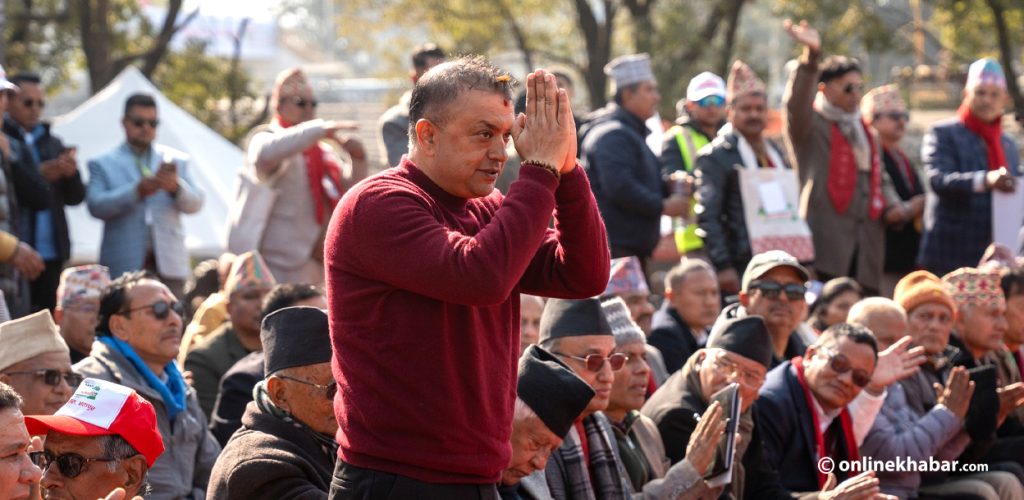
The Nepali Congress is once again set to amend its constitution. The Central Committee meeting, which concluded on September 1, has already decided to form a Draft Committee for Constitutional Amendments. This committee will be tasked with drafting amendments to adapt the constitution to the current context, as per the party’s decision.
The coordinator and members of the draft committee have yet to be appointed, and the responsibility for their nomination has been given to party president Sher Bahadur Deuba after consultations within the party.
Deuba has called a meeting of party officials this morning (Wednesday), where the topic will likely be discussed. Once the committee is formed, discussions on constitutional amendments will begin.
However, party leaders have publicly stated the necessity for amendments, presenting their views during central committee meetings and public events. Key issues for amendment include membership distribution, candidate selection, women’s participation in top positions, the size of party structures, the internal election system, and the expansion of the authority of provincial committees.
Demand for primary elections
A major point raised by leaders is the candidate selection process. Under the current system, four levels of the party distribute candidacy tickets.
There is a growing sentiment that candidates for local, provincial, and federal elections should be selected from among active party members. Some leaders have suggested that members from the relevant areas should choose candidates for local elections. “Instead of distributing tickets from the top, we should move towards primary elections,” said Central Committee member Madhu Acharya. “Those from the constituencies should be allowed to choose their candidates through voting.”
Currently, parliamentary committees at the constituency level select ward members and chairs, while district parliamentary committees select candidates for rural municipality chairpersons and deputy chairpersons. Provincial committees distribute tickets for mayors and deputy mayors of municipalities and sub-metropolitan cities.
For metropolitan mayoral candidates, as well as provincial and federal candidates, the central parliamentary selection committee is responsible.
Although the party’s constitution grants ticket distribution authority to parliamentary committees at various levels, concerns have been raised that the central level has overstepped its bounds. Leaders argue that active members of the relevant structures should choose candidates directly to eliminate the need for members to rely on the central leadership.
According to the current system, up to three names can be recommended for candidacy, but this provision has not been followed in practice, as all names are forwarded to the central level. General Secretary Thapa, in his report, noted that despite the constitutional provision, the selection process is not being implemented as intended.
“The final decision-making body does not even consider the recommendations, criteria, or standards when making selections,” Thapa said. “I believe we need to amend the constitution to ensure candidates are selected through a primary election process involving active members from the relevant areas.”
Other proposed amendments
Another issue raised is that central office bearers and members are automatically considered representatives of the general convention. Some party members believe that all central leaders should be elected from lower levels to serve as general convention representatives, though this has not been reflected in the current constitution.
There have also been calls to amend the provision allowing central leaders, from the party president down to the lower levels, to hold their positions only if they are elected from lower-level structures. “No one should be allowed to bypass the process and directly become a general convention representative with special privileges,” said Central Committee member Acharya.
Organisational size and structure
There are concerns that the work committees at all eight levels of the party are too large, making it difficult to hold meetings. “The size of the organization is so large that we can’t even convene meetings,” said Central Committee member Dr Dila Sangroula. “We need to reduce its size.”
General Secretary Thapa has also highlighted the need for amendments regarding the role of local committees. He noted that the ward committees, as the lowest-level structures of the party, are not involved in the decision-making process despite their importance.
“These committees are closest to the people and their concerns,” Thapa said. “We need to decide whether to maintain the current situation or give them a clearer role in decision-making.”
There are also demands to allow affiliated organizations to operate fully autonomously without party interference. Regarding supportive organizations, leaders have suggested revisiting rules for teachers, government employees, and professors, whose party affiliation is restricted by law. General Secretary Thapa mentioned the need for new regulations for these groups, as current laws prevent them from officially joining the party.
Provincial and women’s rights
The role of women in top leadership positions has been a topic of ongoing discussion within the Congress. Female leaders have been advocating for the constitution to ensure that women are elected to positions such as vice president and general secretary. The current structure guarantees one-third female representation in all committees.
“We need to ensure that women can also reach positions such as vice president and general secretary,” said Central Committee member Dr. Sangroula.
Provincial leaders have also expressed dissatisfaction with the current system, arguing that the provincial committees are often sidelined. “The central leadership bypasses provincial committees,” said Karnali Province President Lalit Jung Shahi. “We should have the authority to distribute tickets for provincial elections.”
Unified membership system
Currently, the party has two types of membership: party members and active members. While party members can become eligible for active membership after one year, leaders have questioned the need for two separate categories.
General Secretary Thapa suggested the need for debate on whether the party should have only one type of membership and that this issue should be addressed in the constitutional amendment process.

























